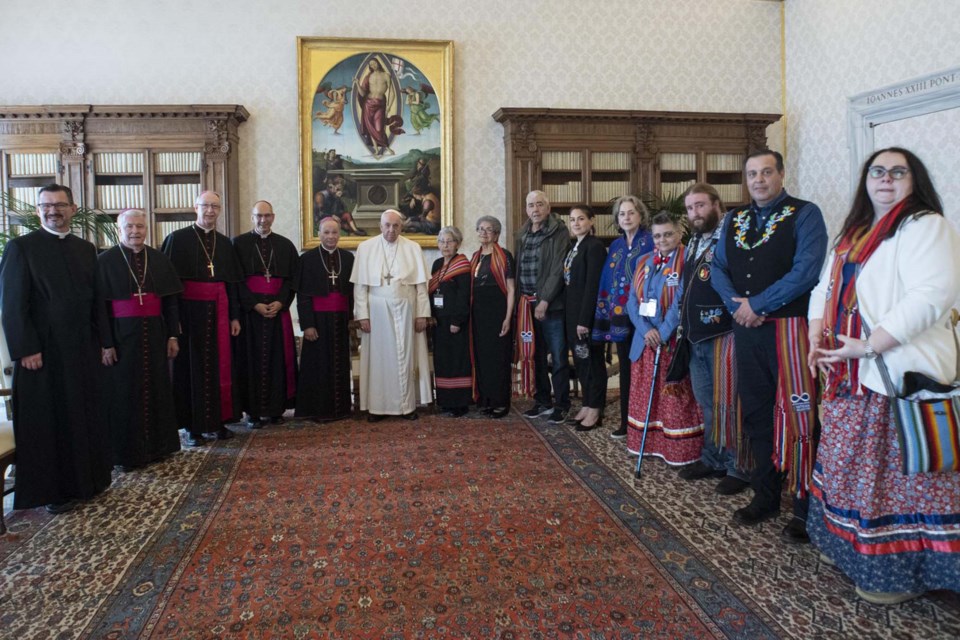Pope Francis offered some memorable words and a long-awaited apology on the last day of his week-long meetings with Canada’s Indigenous delegation.
“I feel shame — sorrow and shame — for the role that a number of Catholics, particularly those with educational responsibilities, have had in all these things that wounded you, in the abuses you suffered, and in the lack of respect shown for your identity, your culture, and even your spiritual values,” he offered in a speech on April 1 to the nearly 30 members who traveled from across Canada and across the Atlantic Ocean for the meetings with him in Vatican City.
“All these things are contrary to the Gospel of Jesus Christ. For the deplorable conduct of those members of the Catholic Church, I ask for God's forgiveness, and I want to say to you with all my heart: I am very sorry. And I join my brothers, the Canadian bishops, in asking your pardon. Clearly, the content of the faith cannot be transmitted in a way contrary to the faith itself: Jesus taught us to welcome, love, serve, and not judge; it is a frightening thing when, precisely in the name of the faith, counter-witness is rendered to the Gospel.”
For many here in this country, the words were a welcome sign of the Catholic Church’s contrition for its role in Canada’s 139 residential schools that took approximately 150,000 Indigenous children away from their families and communities and forced them to renounce their languages and cultures, Many of those children suffered physical, psychological, emotional, spiritual, and other abuses. While incomplete records prevent us from knowing the exact number of deaths of those children while in residential schools, previous estimates indicate there could be more than 30,000 while the search of the grounds on former residential school sites has so far revealed 2,084 suspected unmarked graves.
“This is an important moment for Indigenous peoples, for Canada, and for Catholics around the world,” offered Murray Sinclair, former senator and former chair of the Truth and Reconciliation Commission, in a public statement.
“It is long past time that the Church will begin to take responsibility for its role in the residential school system. It was a dark chapter of Canada’s colonialist history, one which the Church was a key co-author.”
Many Indigenous members of the St. Albert community feel like it’s too soon to offer any response on the Pope’s words or what they mean. Others, however, have much to say, including Dr. Judy Iseke, artist, filmmaker, and former director of Indigenous education at MacEwan University.
"I have read his words. He has located this historical wrong as part of a colonial mindset, which it is. He has identified individual members of the Church as having undertaken these acts of violence. But he has failed to locate the trouble within the structure and belief system of a church that turned its back on generations," she began.
"The systemic violence of the church in colonization seems to be sidestepped here. His apology for members of the Church but not its systemic whole seems still to hide from the truths of this system. It means he has not taken responsibility for this history nor its ongoing colonial actions, holding our ancestral knowledge and relations in vaults in the Vatican museum. Therefore, how can a true healing begin, or repatriation be undertaken, when he denies the ongoing systemic and colonial reality?"
She added that, while his words fall short of "owning the violence of the church itself" in colonial history, his silence on the repatriation of cultural objects is more important.
"Return of stolen goods must be undertaken. I hear no commitment from him on repatriation like he has yet to even consider this his responsibility. Those actions are what might create true healing and he doesn’t mention them. Empty words without actions are not what is needed."
For Sharon Morin, she had difficulty abiding how Canada had to "chase the apology" by going to all the effort of sending the delegation to the Vatican, and with gifts in hand for the Pope on top of it. He should have come to Canada, she said.
"Talk is cheap. It needs action and what we need is reconcili-action. That's what we need. I think that's the most important thing, because there's people like me that are out there, but there's a lot of people that believe in what he said," she said. "You've got to show that you're sorry."




